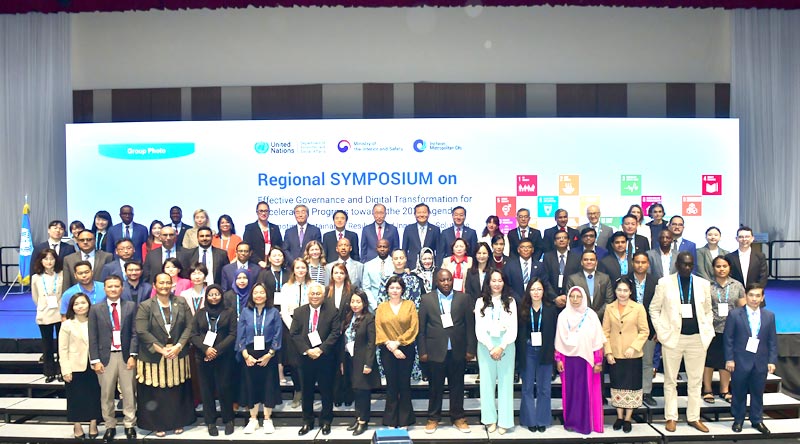Wednesday Feb 18, 2026
Wednesday Feb 18, 2026
Friday, 17 November 2023 00:27 - - {{hitsCtrl.values.hits}}

The Information and Communication Technology Agency (ICTA) of Sri Lanka made significant waves at the 7th Regional Symposium on “Effective Digital Governance and Digital Transformation Promoting Sustainable, Resilient and Innovative Solutions.”
This event, organised in collaboration with the United Nations Department of Economic and Social Affairs (UNDESA), Division for Public Institutions and Digital Governance (DPIDG), the Ministry of the Interior and Safety (MOIS), and Incheon Metropolitan City, was a remarkable platform for global dialogue and recognition.
This symposium served as a pivotal opportunity to address critical public governance issues, explore emerging trends, and introduce innovative methodologies. Its overarching goal was to empower Member States in their pursuit of the 2030 Agenda for Sustainable Development, particularly in the context of the challenges posed by the COVID-19 pandemic and climate change.
During the event, ICTA’s participation was notable. Sri Lanka’s Capacity Building and Regional Digital Transformation Approach was acknowledged as an exemplary case study in advancing the United Nations’ 2030 Agenda for Sustainable Development. This recognition underscores the global relevance and significance of ICTA’s work in the realm of digital transformation.
The conference, a three-day event, featured participants from numerous United Nations member countries. This grand gathering saw expert contributions from 72 speakers and moderators, alongside a staggering total of 1,734 participants—357 attending in person and 1,377 virtually at the event. Under the theme, ‘Accessing the 2030 Sustainable Development Goals through Effective Governance and Digital Transformation,’ the conference delved into the critical issues and strategies underpinning the achievement of these vital goals. ICTA Associate Chief Digital Economy Officer Sameera Jayawardena represented Sri Lanka at this esteemed gathering. He delivered a special session titled “Accelerating Digital Government Transformation in Sri Lanka: Strengthening Digital Governance for Sustainable Development,” sharing insights into Sri Lanka’s approach to promoting digital transformation.
Jayawardena also provided valuable perspectives on the challenges and experiences encountered in this transformative journey.
Attendees at the conference applauded Sri Lanka’s ability to implement these strategies with impressive efficiency, even on a limited government budget, thanks to collaboration with industry partners, community-based organisations, private companies, development institutions, and international corporations. The introduction of competence frameworks, development indicators, and digital development models through the capacity-building and regional digital transformation program showcased Sri Lanka’s potential to swiftly accelerate its digital economy.
Conference representatives underscored the importance of adopting Sri Lanka’s integrated capacity development program model in other countries within the region, a testament to the global applicability of ICTA’s work. This year’s conference emphasised digital transformation and innovation within the public sector, setting the stage for more effective and efficient public services worldwide. Being part of this event signifies ICTA’s growing influence in the realm of digital governance and its significant contribution to sustainable and innovative solutions in the digital era.